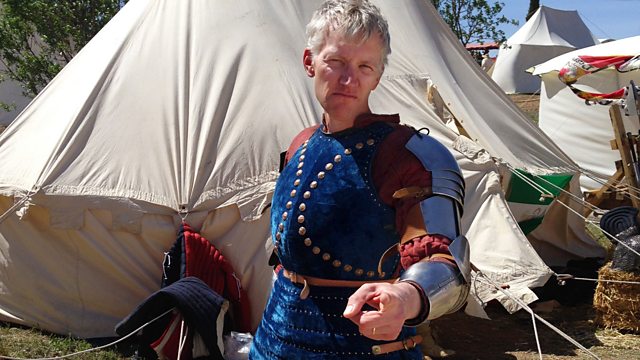28/01/2014
Helen Castor is joined by guests to discuss the latest historical research from across the UK, including how Welsh might originally have been Spanish.
Helen Castor is joined by Professor Sir Barry Cunliffe from Oxford University and the military historian Dr Timothy Bowman from the University of Kent to discuss the latest historical research from across the UK - including how Welsh might originally have been Spanish.
Tom Holland is on the coast of North Wales, just south of Anglesey, with Professor John Koch from the University of Wales whose research on the language of the Celts is changing our understanding of how they arrived in Britain.
Dr Fiona Watson heads for Glasgow and a great fire in 1652 which helps us understand Cromwell's relationship with the city during the Civil War.
And in Connemara on the west coast of Ireland, archaeologist Mike Gibbons explains how the recent storms have destroyed and revealed treasures from the past.
Contact the programme: making.history@bbc.co.uk
Producer: Nick Patrick
A Pier production for �鶹Լ�� Radio 4.
Last on
Programme Guests
Professor �� and ��.
The Origins of the Celts and their language
Tom Holland meets up with Professor John Koch from the University of Aberystwyth on an iron age hill-fort at Dinas Dinlle on the coast of North Wales. This is a coast associated with the Welsh ‘wonder tales’ of the early medieval period but, according to linguists and archaeologists working on a new project at The University of Wales Centre for Advanced Welsh and Celtic Studies, it was also home to a Celtic people who were trading with others all along the Atlantic seaboard of Europe as far back as the Bronze Age and maybe before.
��
Atlantic Europe in the Metal Ages seeks an archaeological context for a known historical linguistic process - i.e. a shared Celtic language as early as the Bronze Age from Orkney down to Spain. Professor Barry Cunliffe believes that this will finally disprove the long-held theory that Celtic people migrated from the Central Europe to places such as West Wales and that the languages spoken their today are simply remnants of this. He asks, “what if the Celts have always been there?”
��
Useful links:
����
��
Storm Damage on the Irish Coast
The winter storms have brought severe damage to coastal communities the length of the Atlantic coast of Britain and Ireland. The impact on archaeology has been dramatic but not always detrimental. Archaeologist Michael Gibbons joined the programme from Connemara in the west of Ireland where sites have been badly damaged but new, older, landscapes revealed.
��
Useful links:
��
The Great Fire of Glasgow - 1652
New work by Dr Kirsteen Mackenzie at the University of Aberdeen shines new light on Cromwell’s attempts to persuade the, then, town of Glasgow to join the English republic in the early years of the 1650’s.�� In a paper for History Scotland, Dr Mackenzie shows how this disastrous fire forced the people of Glasgow to accept financial help from Cromwell’s Parliament in London, thereby ending a stand-off that lasted the best part of two years. Furthermore, this research also highlights the place of Scotland in what is often mistakenly seen as the English Civil War.
��
Useful Links:
��
��
World War One at �鶹Լ��
In late February the �鶹Լ�� will launch its World War One at �鶹Լ�� project. Working with the Imperial War Museum and the Arts & Humanities Research Council, the project will tell the story of WW1 through the people whose lives were transformed.��
��
These stories are planned to be broadcast on local radio and regional television in �鶹Լ�� English Regions and on television and radio in �鶹Լ�� Wales, �鶹Լ�� Scotland and �鶹Լ�� Northern Ireland.
��
Related link:
Broadcast
- Tue 28 Jan 2014 15:00�鶹Լ�� Radio 4
Podcast
-
![]()
Making History
Popular history series where the past connects with the present.


